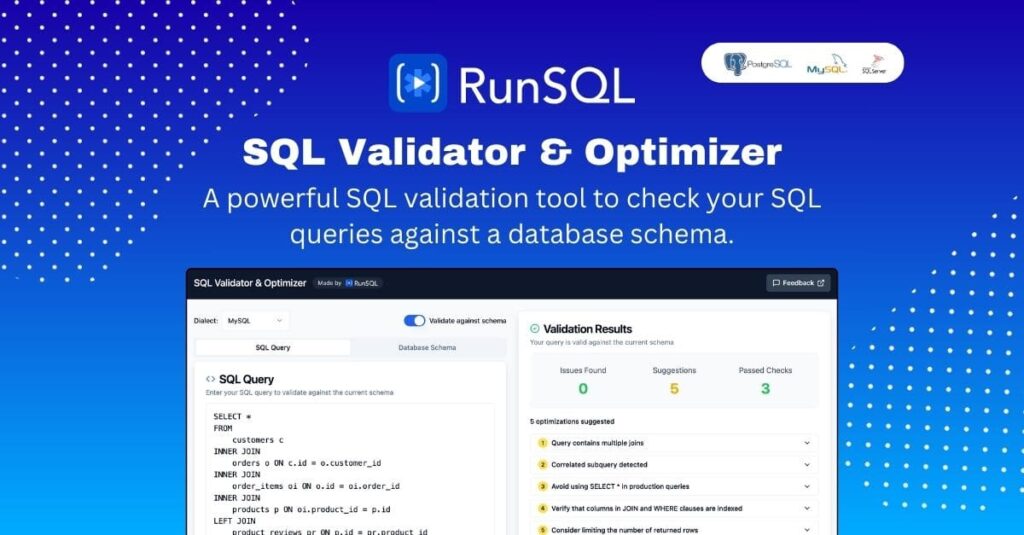Anyone who has worked with SQL knows how frustrating debugging queries can be. Whether you are a junior developer, a seasoned DBA, or simply learning, small mistakes can quickly derail productivity: a missing semicolon, an unfiltered SELECT *, or a WHERE clause left out that unintentionally pulls millions of rows.
To tackle these issues, the dbdiagram team has introduced SQL Validator, a free and lightweight tool designed to save time and encourage best practices when working with SQL.
What SQL Validator Brings to the Table
The mission behind SQL Validator is simple: make writing and validating SQL queries faster, easier, and smarter. Its core features include:
- Missing Semicolon Detection: a reminder for one of the most common oversights.
- Warnings on
SELECT *: encourages selecting only the necessary columns to improve query performance and readability. - Missing
WHEREClause Alerts: flags queries that risk returning too many rows and suggests adding filters. - Index Checks on
JOINandWHEREColumns: with schema mode enabled, it validates that referenced columns are indexed. - Performance Bottleneck Identification: highlights problematic patterns such as overly complex subqueries, heavy window functions, or
LIKEclauses with leading wildcards, offering alternatives like CTEs or materialized views.
What makes SQL Validator practical is its no-signup, no-hassle approach: it works instantly in the browser, requires no installation, and gets developers back to coding instead of fighting syntax errors.
RunSQL: A Playground for SQL
SQL Validator is part of the broader RunSQL ecosystem, which functions as an online SQL playground. It allows users to:
- Design and run queries without installing any software.
- Model tables using DBML and share results with team members.
- Experiment across multiple database engines, including MySQL, PostgreSQL, and SQL Server.
This versatility makes it an appealing tool not only for professional developers but also for students and educators looking to practice SQL in a lightweight, browser-based environment.
Community Feedback and Future Directions
RunSQL has already gained attention in its community forums. Some users have suggested turning the platform into a learning and assessment tool by adding quiz-like features. For example, defining datasets, posing challenges, and automatically checking query results against expected outputs could make RunSQL suitable for certification exams or classroom use.
While these features are not yet available, the development team has shown openness to feedback, indicating that the platform may evolve into a training and evaluation environment for SQL skills.
Why Tools Like SQL Validator Matter
Modern organizations rely on data more than ever, and poorly written queries can translate into slower applications, higher infrastructure costs, and frustrated teams. Tools that automate validation and provide best-practice nudges help minimize errors early and improve both productivity and performance.
For learners, SQL Validator also reduces the friction of setup and debugging, enabling them to focus on learning SQL concepts rather than troubleshooting syntax. For teams, it offers a lightweight layer of quality assurance before queries ever hit production systems.
Conclusion
With SQL Validator, RunSQL strengthens its position as a free, accessible, and collaborative playground for databases. By catching errors early and encouraging performance-aware practices, it empowers developers and students alike to write cleaner, more efficient queries.
In a landscape where data is the backbone of digital business, tools like this help ensure that the pipelines feeding analytics, applications, and decision-making are as robust as possible.
Frequently Asked Questions
Does SQL Validator support multiple database engines?
Yes. RunSQL supports running and validating queries against MySQL, PostgreSQL, and SQL Server, and allows table modeling with DBML.
Do I need to sign up to use SQL Validator?
No. It is completely free and requires no registration — just open it in your browser and start validating queries.
What types of errors can it detect?
From basic mistakes like missing semicolons, to performance issues such as unindexed joins, inefficient LIKE patterns, and overly complex subqueries.
Is RunSQL suitable for educational use?
Yes. While it doesn’t yet have built-in quiz functionality, educators can define datasets and test queries, making it a useful tool for teaching and practicing SQL.

